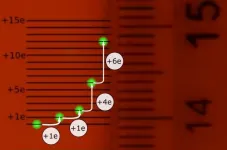The drugs, known as POLQ inhibitors, specifically kill cancer cells with mutations in the BRCA genes while leaving healthy cells unharmed.
And crucially, they can kill cancer cells that have become resistant to PARP inhibitors - an existing treatment for patients with BRCA mutations.
Researchers are already planning to test the new drug class in upcoming clinical trials. If the trials are successful, POLQ inhibitors could enter the clinic as a new approach to treating a range of cancers with BRCA mutations, such as breast, ovarian, pancreatic and prostate cancer.
Scientists at The Institute of Cancer Research, London, and the pharmaceutical company Artios, explored the potential of using POLQ inhibitors in treating cancer cells with defects in the BRCA genes.
Their study, published today (Thursday) in Nature Communications, was funded by Artios, Cancer Research UK and Breast Cancer Now.
For some time now, scientists have known that genetically removing a protein known as POLQ killed cells with BRCA gene defects, although drugs that prevent POLQ from working had not been identified.
In this new work, the researchers identified prototype drugs that not only stop POLQ from working, but which also kill cancer cells with BRCA gene mutations.
Both BRCA genes and POLQ are involved in repairing DNA. Cancer cells can survive without one or other of them, but if both are blocked or their genes switched off, cancer cells can no longer repair their DNA and they die.
Researchers found that when cells were treated with POLQ inhibitors, cancer cells with BRCA gene mutations were stripped of their ability to repair their DNA and died, but normal cells did not. By killing cancer cells with BRCA gene mutations, while leaving normal cells unharmed, POLQ inhibitors could offer a treatment for cancer with relatively few side effects.
Researchers also found that POLQ inhibitors work very well when used together in combination with PARP inhibitors.
The addition of POLQ inhibitors meant that PARP inhibitors were effective when used at a lower dose. And in laboratory tests in rats and in organoids - three-dimensional mini-tumours grown in the lab - POLQ inhibitors were able to shrink BRCA-mutant cancers that had stopped responding to PARP inhibitors because of a defect in a set of genes known as the 'Shieldins'.
This suggests that POLQ inhibitors could offer an alternative treatment where PARP inhibitors are no longer working. Researchers believe that using a POLQ inhibitor in combination with a PARP inhibitor in patients with cancers that have faulty BRCA genes could prevent resistance from emerging in the first place.
Scientists at The Institute of Cancer Research (ICR), funded by Breast Cancer Now and Cancer Research UK, discovered how to genetically target PARP inhibitors against BRCA-mutant cancers and, with colleagues at The Royal Marsden NHS Foundation Trust, helped run clinical trials leading to the first PARP inhibitor being approved for use.
The next step will now be to test POLQ inhibitors in clinical trials led by Artios.
Study co-leader, Professor Chris Lord, Professor of Cancer Genomics at The Institute of Cancer Research, London,and Deputy Director of the Breast Cancer Now Toby Robins Research Centre at the ICR, said:
"All cells have to be able to repair damage to their DNA to stay healthy - otherwise mutations build up and eventually kill them. We have identified a new class of precision medicine that strips cancers of their ability to repair their DNA. This new type of treatment has the potential to be effective against cancers which already have weaknesses in their ability to repair their DNA, through defects in their BRCA genes. And excitingly, the new drugs also seem to work against cancer cells that have stopped responding to an existing treatment called PARP inhibitors - potentially opening up a new way of overcoming drug resistance. I'm very keen to see how they perform in clinical trials."
Professor Paul Workman, Chief Executive of The Institute of Cancer Research, London, said:
"It's exciting that the new POLQ inhibitors should provide a different approach to treating cancers with BRCA gene defects - and particularly that this class of drugs should retain their activity in cancers that have developed resistance to PARP inhibitors. Most exciting of all is the potential of combining POLQ and PARP inhibitor drugs to prevent the evolution of BRCA-mutant cancers into more aggressive, drug-resistant forms - a major challenge that we see in the clinic."
Study Co-Leader, Dr Graeme Smith, Chief Scientific Officer at Artios Pharma, Cambridge, said:
"These exciting preclinical results provide a clear rationale for future clinical studies with a POLQ inhibitor. At Artios, we are on track to initiate our POLQ clinical programme before the year end to explore POLQ inhibition in the sensitive cancer types that this study has uncovered. Our planned POLQ inhibitor clinical studies will leverage these results, exploring combination treatment with PARP inhibitors and different types of DNA damaging agents." Michelle Mitchell, chief executive at Cancer Research UK said:"More than 25 years ago we helped discover the BRCA gene, which spurred on our scientists to work with others to develop PARP inhibitors, which are now benefiting many patients. But we are always trying to find newer and better ways to outstep cancer, especially when it stops responding to current treatments. By revisiting weaknesses in the BRCA repair pathway, researchers have not only found a way to make PARP inhibitors more effective, but they may have also identified an entirely new class of targeted drugs for BRCA cancers, which could include pancreatic cancer which has limited treated options. We look forward to seeing if these promising results in the lab transfer into benefits for patients when tested in trials."
Dr Simon Vincent, Director of Research, Support and Influencing at Breast Cancer Now, said:
"Men and women with a change in one of their BRCA genes are at greater risk of being diagnosed with breast cancer, and around 5% of the 55,000 cases of breast cancer diagnosed in UK each year are caused by an inherited altered gene, which includes BRCA1 and BRCA2 genes.
"It's therefore hugely exciting thatPOLQ inhibitors could provide a targeted treatment option for people whose cancer is caused by altered BRCA genes. As a targeted treatment, we hope that POLQ inhibitors could be a kinder alternative, with less side effects than current treatment options.
"Drug resistance is a major hurdle that we must tackle to stop women dying from breast cancer, so it is also exciting that POLQ inhibitors offer a hope of overcoming resistance in some cases.
"We hope that future research will confirm that POLQ inhibitors can benefit people with breast cancer in these ways."
INFORMATION:
Notes to editors:
For more information please contact Molly Andrews in the ICR press office on 020 7153 5246 or molly.andrews@icr.ac.uk. For enquiries out of hours, please call 07595 963 613.
The Institute of Cancer Research, London, is one of the world's most influential cancer research organisations.
Scientists and clinicians at The Institute of Cancer Research (ICR) are working everyday to make a real impact on cancer patients' lives. Through its unique partnership
with The Royal Marsden NHS Foundation Trust and 'bench-to-bedside' approach, the ICR is able to create and deliver results in a way that other institutions cannot. Together the two organisations are rated in the top four centres for cancer research and treatment globally.
The ICR has an outstanding record of achievement dating back more than 100 years. It provided the first convincing evidence that DNA damage is the basic cause of cancer, laying the foundation for the now universally accepted idea that cancer is a genetic disease. Today it is a world leader at identifying cancer-related genes and discovering new targeted drugs for personalised cancer treatment.
The ICR is a charity and relies on support from partner organisations, funders and the general public. A college of the University of London, it is the UK's top-ranked academic institution for research quality, and provides postgraduate higher education of international distinction.
The ICR's mission is to make the discoveries that defeat cancer. The research was conducted at the Breast Cancer Now Toby Robins Research Centre at The Institute of Cancer Research, London.
For more information visitICR.ac.uk
About Cancer Research UK
- Cancer Research UK is the world's leading cancer charity dedicated to saving lives through research.
- Cancer Research UK's pioneering work into the prevention, diagnosis and treatment of cancer has helped save millions of lives.
- Cancer Research UK has been at the heart of the progress that has already seen survival in the UK double in the last 40 years.
- Today, 2 in 4 people survive their cancer for at least 10 years. Cancer Research UK's ambition is to accelerate progress so that by 2034, 3 in 4 people will survive their cancer for at least 10 years.
- Cancer Research UK supports research into all aspects of cancer through the work of over 4,000 scientists, doctors and nurses.
- Together with its partners and supporters, Cancer Research UK's vision is to bring forward the day when all cancers are cured.
For further information about Cancer Research UK's work or to find out how to support the charity, please call 0300 123 1022 or visithttp://www.cancerresearchuk.org.
Follow us onTwitterandFacebook.
About Breast Cancer Now:
- Breast Cancer Now is the UK's first comprehensive breast cancer charity, combining world-class research and life-changing care.
- Breast Cancer Now's ambition is that, by 2050, everyone who develops breast cancer will live and be supported to live well.
- Breast Cancer Now, the research and care charity, launched in October 2019, created by the merger of specialist support and information charity Breast CancerCare and leading research charity Breast Cancer Now.
- Visit breastcancernow.org or follow us on Twitter or on Facebook.
- For support or information call Breast Cancer Now's free Helpline on 0808 800 6000.







